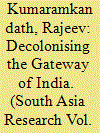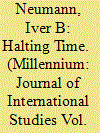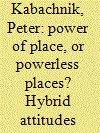|
|
|
Sort Order |
|
|
|
Items / Page
|
|
|
|
|
|
|
| Srl | Item |
| 1 |
ID:
172241


|
|
|
|
|
| Summary/Abstract |
In 2014–2016, the central Ukrainian city of Poltava witnessed the demolition of a Lenin monument and the construction of a monument dedicated to the Ukrainian Cossack hetman Ivan Mazepa. Taking this alteration of the cityscape as a case study, this article examines the change and continuity of political order in post-communist Ukraine in general, and in post-Maidan Ukraine specifically. By investigating the contested meanings of monuments in the city, the article uncovers various ethnonational, religious, political and gender-specific features of Ukrainian society. In so doing, it builds upon the scholarly literature that investigates the symbolic role of monuments in political transformation and draws on a range of data sources including the observation of monuments, policy documents and media coverage.
|
|
|
|
|
|
|
|
|
|
|
|
|
|
|
|
| 2 |
ID:
188839


|
|
|
|
|
| Summary/Abstract |
This article interrogates how a colonial monument, the Gateway of India in Mumbai, former Bombay, continues to carry and be endowed with a title that is a misplaced embodiment of Indian social histories. Built in the 1920s, this monument, definitely a work of architectural grandeur, continues to carry its erroneous rendition and confines India’s vast social histories to the colonial moment, with an anglo-centric focus. As the monument symbolises the memory of the colonial regime, it also signifies its oppression as well as its exit from the subcontinent, rather than witnessing anyone coming to India, except King George in 1911, as the monument’s title seems to suggest. A mnemonic device of colonialism, this misleading label needs to be seriously revisited, for it not only romanticises the colonial past but also fails to lead our memories back to certain crucial episodes in earlier social histories, from which the monument and its specific place, Mumbai, are more or less fully absent.
|
|
|
|
|
|
|
|
|
|
|
|
|
|
|
|
| 3 |
ID:
159793


|
|
|
|
|
| Summary/Abstract |
Drawing on identity and prototype theory, the article sets out to analyse the historically dominant monumentalising ways in which polities try to shore up their own Selves by halting their Others in time. The first part of the article discusses how monuments represent Self/Other relations from ancient Mesopotamia in the East to modern Britain in the West by limning off a constitutive outside, be that as visual absence or presence. Temporality is of the essence here, with the basic idea being that the Self is in temporal motion, while the Other is literally petrified. I then postulate that the Other is halted in time in three basic ways: as visual absence, as dead and as subjugated. Crucially, however, the Second World War is actually the end point of the extraordinary stability of monumental ways in which to represent the Other. We see the tentative emergence and damning of a fourth Other, namely a previous incarnation of the Self. I conclude, with Norbert Elias, that the fading away of the Other as dead and as subjugated is significant as part of a civilisation process that works against denying the Other its future agency.
|
|
|
|
|
|
|
|
|
|
|
|
|
|
|
|
| 4 |
ID:
159259


|
|
|
|
|
| Summary/Abstract |
This article explores the hybridity of commemoration by analysing people’s attitudes to three types of contested Soviet symbols in post-Soviet Georgia. I draw on 62 in-depth qualitative interviews conducted in 2012–2013 with Georgians in Tbilisi, Georgia. These interviews focused on what people thought about places of memory, Soviet symbols in public space, and memory politics and policies in contemporary Georgia. I examine their opinions of three different types of reminders of the Soviet past in public space: general Soviet symbols; street names; and the Stalin monument in Gori. This analysis reveals their diverse understandings of place and highlights the hybridity of their responses to the different elements of Soviet symbolism. This not only prevents one from creating ideal typologies when considering places of memory, but also highlights the impact of the form and location of the symbol. I also identify two ways that people conceptualize place, one that recognizes the power of place, and the other that perceives place as powerless.
|
|
|
|
|
|
|
|
|
|
|
|
|
|
|
|
| 5 |
ID:
092942


|
|
|
|
|
| Publication |
2009.
|
| Summary/Abstract |
Frey and Rohner (2007) propose that governments credibly commit to reconstruction of cultural monuments, as this would deter terrorist attacks on monuments. We contend that precommitment will serve primarily to redirect terrorist attacks toward non-replicable targets, possibly leading to loss of human life and physical capital at the expense of protecting monuments. The cost savings from lowering onsite security are minimal, thus funds would need to be redirected from other governmental activities to protect monuments.
|
|
|
|
|
|
|
|
|
|
|
|
|
|
|
|
| 6 |
ID:
076955


|
|
|
|
|
| Publication |
2007.
|
| Summary/Abstract |
Famous cultural monuments are often regarded as unique icons, making them an attractive target for terrorists. Despite huge military and police outlays, terrorist attacks on important monuments can hardly be avoided. We argue that an effective strategy to discourage terrorist attacks on iconic monuments is for a government to show a firm commitment to swift reconstruction. Using a simple game-theoretic model, we demonstrate how a credible claim to rebuild any destroyed cultural monument discourages terrorist attacks by altering the terrorists' expectations and by increasing the government's reputation costs if they fail to rebuild
|
|
|
|
|
|
|
|
|
|
|
|
|
|
|
|
| 7 |
ID:
174883


|
|
|
|
|
| Summary/Abstract |
In 1997 a monument dedicated to Heroes of the Soviet Union Aliya Moldagulova and Manshuk Mametova was unveiled on the former site of the monument to Lenin in central Almaty. This case study investigates the valorization of these Soviet-era World War II heroes in independent Kazakhstan, and argues that the Kazakhstani state has recast these heroes as significant figures in the official centuries-long history of Kazakhstan. Incorporating and commemorating the Soviet experience of World War II as part of the narrative of an independent state provides an avenue for legitimating Kazakhstani nation-building efforts. Incorporating regionally important stories of women heroes through monuments and commemorative activities demonstrates the symbolic and instrumental roles that monuments in public spaces play in reinforcing officially acceptable gender roles and in structuring power relations between the regions and the centre in Kazakhstan and between Kazakhstan and Russia.
|
|
|
|
|
|
|
|
|
|
|
|
|
|
|
|
|
|
|
|
|